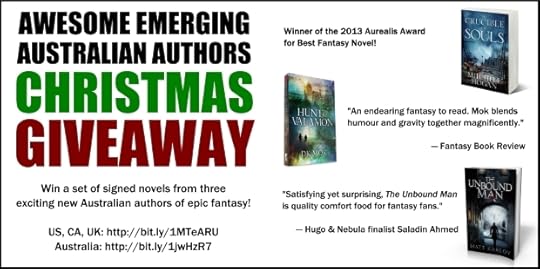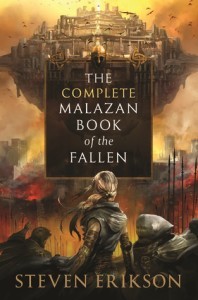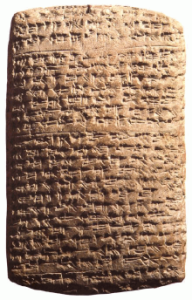Matt Karlov's Blog, page 2
January 8, 2016
End of year update
I’m a couple of weeks late with this post — but better late than never, right? Here’s where things stand as we farewell 2015 and gear up for a new year.
Next novel
A few days ago I passed the halfway point of the first draft of The Unbound Man’s sequel, still tentatively titled The Lordless City. The word count of the first half is just shy of 85,000, which is pretty similar to the first half of The Unbound Man. So far there have been no major divergences from the outline. Some smaller surprises, yes, and the emergence of several unexpected character threads which contribute some pleasing depth and ambiguity to the whole, but nothing so significant as to pull the story off-track. All of which is to say: so far, so good.
Those of you who remember my last update may recall that in late August I was about a third of the way through the first draft; now, four or so months later, I’ve made it to halfway. If one projects that rate of progress forward into 2016, one might reasonably assume that I could finish this draft by the end of the year. To which I can only say: yes, I noticed that too. I’ve been frustrated for most of 2015 at not being able to write more quickly (primarily due to time constraints), but the truth is that I’ve been progressing significantly faster than anything I managed while writing The Unbound Man. I very much hope that I will complete this draft before the year is out. We shall see.
Short stories
I’ve been making vague comments for a while about maybe putting out a short story sometime soon. I don’t have anything new to report on this just yet, so for the moment those vague comments still stand. As soon as I can say anything more specific, I will.
Other activities
In the wake of the Self-Published Fantasy Blog-Off, I participated in a two-part round table with a number of other SPFBO participants over at Fantasy Book Critic. This was followed up by a guest post on the subject of building a world, in which I talked about my various sources of inspiration for the setting of The Unbound Man and how I went about constructing it.
Then in December, I teamed up with Mitchell Hogan and DK Mok to run a Christmas giveaway. Congratulations to the winners, Ilir G and Karla: your books are on their way!
Thank you
Finally, my thanks to everyone who read The Unbound Man in 2015. There’s no shortage of books to read out there, and without the platform or marketing support of some of the bigger names it can be tough to get noticed. Thank you to everyone who gave The Unbound Man a shot. I hope to have more stories for you soon.
The post End of year update appeared first on Matt Karlov.

December 4, 2015
Christmas giveaway

Do you like epic fantasy? Do you like winning things? How about books that have been signed by their author? If you answered ‘yes’ to all three questions, the Awesome Emerging Australian Authors Christmas Giveaway is for you.
Win a bundle of the following books:
A Crucible of Souls by Mitchell Hogan (2013 Aurealis Award winner!)
Hunt for Valamon by DK Mok
The Unbound Man by me, Matt Karlov
One bundle will be won by somebody in the US, CA, or UK. Another will be won by somebody in Australia.
US / CA / UK residents can enter here:
Australian residents can enter here:
The giveaway closes on December 24. Don’t miss out!
The post Christmas giveaway appeared first on Matt Karlov.

November 20, 2015
Things I Like: The Malazan Book of the Fallen
It’s hard to know what to say about Steven Erikson’s superb ten-volume Malazan Book of the Fallen that hasn’t already been said. Phenomenal? Epic? Absolutely. Complex, funny, tragic, deep? Without a doubt. The greatest work of fantasy yet written? In my opinion, yes.
 Perhaps I can put it best by saying that the Malazan series is the most complete work of fiction I have ever encountered. Somehow, Erikson has managed to combine an astonishing breadth of scope with a no less astonishing depth of insight and theme. His plotting is brilliant. His exploration of character is second to none, for both variety and depth. His setting is as epic as you’re ever likely to see. His prose is masterful. Erikson never pulls his punches, but neither are the books unremittingly grim. Over the course of the series, just about every facet of human existence is explored, questioned, and put into new perspective. Yet the emotional payoff at the end of each volume is always compelling and frequently devastating.
Perhaps I can put it best by saying that the Malazan series is the most complete work of fiction I have ever encountered. Somehow, Erikson has managed to combine an astonishing breadth of scope with a no less astonishing depth of insight and theme. His plotting is brilliant. His exploration of character is second to none, for both variety and depth. His setting is as epic as you’re ever likely to see. His prose is masterful. Erikson never pulls his punches, but neither are the books unremittingly grim. Over the course of the series, just about every facet of human existence is explored, questioned, and put into new perspective. Yet the emotional payoff at the end of each volume is always compelling and frequently devastating.
This is a series which changes its readers. Is there any higher compliment for a work of fiction than that?
And for people like me who are scratching out their own stories, the Malazan series shows just how much you can do with words. Erikson himself has deconstructed this aspect of his work in a series of essays which I’d recommend to anyone with an interest in the craft of writing.
No work of fiction stands alone, of course. Without Tolkien, without others along the way, the Malazan series would never have come into being. All the same, if I was asked to name the single greatest achievement in the field of fantasy, I wouldn’t have to think about it for even a moment. The Malazan Book of the Fallen stands head and shoulders above every other work of fantasy I’ve ever read.
The post Things I Like: The Malazan Book of the Fallen appeared first on Matt Karlov.

October 9, 2015
Things I Like: Braid
My inaugural Things I Like post was about an ancient Akkadian piece of philosophical / satirical literature, so for this follow-up post I’ve decided to skip ahead several thousand years and talk about an indie computer game, Braid.
Braid is a two-dimensional platform game. On the surface, it looks much the same as any other platform game: you jump from here to there, avoiding creatures and collecting items, in this case puzzle pieces. But there’s one key difference between this and other games: the flow of time works differently on each level. Right at the start you find that you have the ability to rewind time, and as the game progresses you discover objects and creatures that interact with time differently, items which slow the passage of time around them, even worlds where your direction of movement determines the direction of time.
And the notion of time’s malleability is not confined to game mechanics. The game’s protagonist, Tim, is trying to atone for some unfortunate mistake involving a princess and a monster. His reflections accompany the player’s progress throughout the game, forming an intriguing, multi-layered narrative exploring the experience of life within time.
Braid is only a short game — you’ll probably finish it in less then 10 hours — but it has more depth than a lot of games many times its length. Its creator, Jonathan Blow, has some fascinating ideas about games and what they can be. His next game will be The Witness, which is due for release some time in 2016. If Braid is anything to go by, it will be well worth checking out.
The post Things I Like: Braid appeared first on Matt Karlov.

September 4, 2015
Things I Like: The Dialogue of Pessimism
In an effort to liven up the blog a little, I’m starting what I hope will become a semi-regular series about things which I think deserve a wider audience. “Things” is a deliberately vague term — many of my recommendations will no doubt come from the world of literature and entertainment, but there’s no telling what else might crop up here on occasion. Posts will probably err on the side of brevity, as this won’t be sustainable if it takes too much time away from my novel writing, but we’ll see how we go.
And so, without further ado, here’s the first Thing I Like: the Dialogue of Pessimism.
Image in public domain
The Dialogue of Pessimism is an ancient text from Babylon and Assyria consisting of a series of short exchanges between a master and a slave. In each exchange, the master proposes some course of action, to which the slave enthusiastically agrees; then the master changes his mind, and the slave finds reasons to agree just as enthusiastically with the new proposal.There are so many levels on which to enjoy the Dialogue. Is it a critique of the capriciousness of those who possess power? A satire of the obsequiousness of human reason, ever ready to rationalise whatever decision one has already made? A commentary on the absurdity of life, a mere 3,000 years before the advent of Kierkegaard and existentialism? More than likely, it’s all of the above — and with the kind of references to then-contemporary culture (such as the Epic of Gilgamesh) that would make an Akkadian Joss Whedon proud.
Wikipedia’s page for the Dialogue suggests that it may have been intended for public performance as much as private reading. Performing the Dialogue would have created an opportunity to add yet more layers, contextualising it for a particular city or ruler or circumstance. It’s fascinating to think of an ancient audience taking in the Dialogue on a dusty Babylonian street corner, or to picture some cuneiform-scribe tapping out the words on clay tablets, perhaps at the request of his own master.
Sadly, some fragments of the Dialogue have been lost to time. But there’s still plenty to enjoy. Come for the satire, stay for the Mesopotamian wisdom — and don’t miss the slave’s cheeky closing remark to his master.
The post Things I Like: The Dialogue of Pessimism appeared first on Matt Karlov.

August 29, 2015
Mid-year update
I’ve been neglecting this blog lately, but I thought I’d dust it off to give an update on the state of the next book and some other bits and pieces.
Next novel
I’m hard at work on the sequel to The Unbound Man, tentatively titled The Lordless City. Right now I’m about a third of the way through the first draft. What, only a third? Well, yes. Progress has been slower than I’d hoped, largely due to life stuff unrelated to writing. (Such a pesky thing, life — always getting in the way of what you really want to do.)
The good news is that beginnings are always the hardest part of a story for me. I hope and expect to pick up speed from this point on. In fact, it’s already started to happen. I’m pretty happy with the chapters I have so far, and I’m excited about where the book is headed. If you enjoyed The Unbound Man, I think you’ll like this one, too.
Short stories
I have several of these at various stages of completion & submission, but no news to report just yet. It’s possible that one of them might make its way onto Amazon in the not too distant future. Stay tuned.
The Great Self-Published Fantasy Blog-Off
I entered The Unbound Man in Mark Lawrence’s Self-Published Fantasy Blog-Off (SPFBO for short). It received a lovely review on Bookworm Blues (about halfway down the page) and was named winner of its sub-group, but unfortunately just missed out on the overall group win. Well, I say ‘just’, but in all honesty I have no idea where it might have been positioned among the other sub-group winners. Still, it’s nice to look at that review and imagine that The Unbound Man was this close to becoming a finalist, isn’t it? (Yes, it is.)
The SPFBO has really highlighted how much great self-published fantasy is out there these days. I’ve come across a number of books which I now want to read (and not just finalists, either). If you want to know more, D. Moonfire has put together a handy reference page with details of every book in the contest. Some of the data is still being added, but the page is well worth a look.
The post Mid-year update appeared first on Matt Karlov.

April 24, 2015
KDP Select experiment over
Six months ago I removed The Unbound Man from non-Amazon ebook retailers and enrolled it in KDP Select to try out the promotional tools and the (then quite new) Kindle Unlimited program.
Three months ago, after a successful promotion and some encouraging Kindle Unlimited sales, I extended the experiment for a further ninety days, largely to see if the KU performance would continue.
Now, with that second period of ninety days almost over, I’m bringing the experiment to a close. In the next few days The Unbound Man will drop out of KDP Select and Kindle Unlimited, and will begin to reappear on Kobo, iBooks, and elsewhere.
The reasons are pretty straightforward. I was never particularly happy with giving Amazon exclusive rights to ebook sales (as I elaborated on in some detail in that first post). Nonetheless, if KU sales had continued to show some momentum, that might have been enough to make me think about extending the arrangement for another three months. But that simply hasn’t happened. At this point I’m in a position of excluding all non-Amazon platforms for the sake of a handful of KU sales, and that’s simply not worth it — on any level.
So the experiment ends. It’s a disappointing conclusion, but not an unsuccessful one. The goal was to discover what KDP Select had to offer, and that’s been achieved. Now I can begin to explore some non-Amazon alternatives, starting with the other main ebook retailers.
So if you’re a KU reader who hasn’t yet picked up The Unbound Man, get it while you can! Soon it will be gone from that program — though it will of course remain available on Amazon as an ordinary purchasable title.
And if you’re a non-Amazon ebook reader, thank you for your patience. The Unbound Man will soon be available at your preferred retailed once more. I hope you’ll check it out!
The post KDP Select experiment over appeared first on Matt Karlov.

March 27, 2015
Quote cards from The Unbound Man
Just a quick update today to let you know about the arrival of some digital quote cards on the new Extras page. Grab your favourite and share it with your friends on Twitter, Facebook, Diaspora, email, or chatting with your neighbour over the back fence.
And if there’s a quote from The Unbound Man you particularly like that didn’t make it into the first set of cards, let me know about it in the comments and I’ll see if we can include it next time around…
The post Quote cards from The Unbound Man appeared first on Matt Karlov.
January 24, 2015
Kindle Unlimited, three months on
Three months ago, with a slightly immoderate amount of handwringing, I pulled The Unbound Man from Kobo, iBooks, and other ebook retailers and enrolled in KDP Select. I did this with some fairly hefty reservations about Amazon’s exclusivity requirements, but I felt that a three month experiment was worth running. And I promised that when the three months were up, I’d assess the results and decide whether to continue the experiment or wrap it up and republish the ebook outside Amazon.
So here we are, three months on. What’s happened?
The first two months of KDP Select were disappointing to say the least. Regular sales continued to bump along, but Kindle Unlimited barely registered. Some writers have reported KU taking over half or more of their sales, but in the case of The Unbound Man, KU accounted for little more than 10% of total units sold. At Christmas the result looked pretty clear. KDP Select was doing nothing for me. When the ninety days expired, I’d end the trial and move on.
Then, in the week between Christmas and the new year, I ran a moderately-successful promotion (100+ sales in a couple of days). The residual post-promotion sales tailed off after a week or so… but in their wake, starting early January, an interesting thing happened. Kindle Unlimited sales started to pick up.
In the last few weeks, regular sales have more or less returned to where they were prior to the promotion, but KU sales have increased dramatically to roughly double the number of regular sales. And that’s not just people who grabbed the book during the promo and took a few weeks to hit the 10% mark — the sales rank has had repeated boosts from new KU readers downloading the book. In raw numerical terms, it’s still not huge, but it’s a definite shift from the pre-promotion pattern.
Maybe it’s just a blip in Amazon’s imponderable algorithms. Maybe the book is actually starting to get a bit of traction in the KU market. Maybe it’s a mixture of both, or the result of some other factor I’m not aware of, or mere chance. Who knows?
Whatever the case, I’ve decided to extend this experiment by another three months. If these results are an indication that The Unbound Man is starting to get some traction, it would be silly to throw that away. And if they’re just a blip, well, that’s fine too. Three months from now I’ll have another chance to pull the pin and turn my focus to other distributors.
Medium to long term, my outlook remains the same. Wide, non-exclusive distribution is still where I want my books to be. Perhaps, when I sit down to write another of these updates in late April, that’s where we’ll be headed.
Let’s see what the next three months bring.
The post Kindle Unlimited, three months on appeared first on Matt Karlov.
November 12, 2014
Existential fantasy
In 2000, fantasy author R. Scott Bakker wrote an article about the place of fantasy in contemporary culture. Fantasy, he said, represented “the primary literary response to what is often called the ‘contemporary crisis of meaning.’” Bakker argued that the march of science and rationalism had revealed the world to be apparently meaningless, and fantasy’s response was to present stories in invented worlds which, unlike the real world, had not been “disenchanted” — stories of the fantastic about “individuals certain of [their] meaningfulness in a meaningful world.”
Though I had some quibbles with a few details of the article, overall I found it to be an insightful and compelling piece. As Bakker said, “In a culture antagonistic to meaning, the bald assertion that life is meaningful is not enough. We crave examples.” And if there was one thing that all fantasy seemed to share, it was a commitment to meaningfulness.
But that was then. From the vantage point of 2014, the nature of fantasy no longer seems so clear.
The most significant development in fantasy in the past decade-and-a-half has undoubtedly been the rise of “gritty fantasy” — or, as some would have it, “grimdark”: a term originally used as a pejorative but increasingly becoming a simple descriptor. This is fantasy shorn of its comfortable assumptions. No good characters and bad characters, just grey characters and other grey characters. People die abrupt and messy deaths. On occasion, someone might find themselves trying to save the world; yet on another level, there seems to be profound doubt about whether the world is even savable. It’s hard to characterise these stories as being about meaningful individuals in a meaningful world — and yet, somehow, they’re still recognisably fantasy.
What’s going on?
It seems to me that fantasy is in the process of shedding its pre-Enlightenment heroism and embracing instead a kind of contemporary existentialism. The depiction of a world empty of higher purpose would have once seemed anathema to fantasy; today, it is almost de rigueur. The increasingly tight focus on character used by the likes of George R. R. Martin and Joe Abercrombie makes clear the subjective nature of the tale we’re being told and introduces us to a hundred different forms of existential uncertainty. And many of us reach for such stories because they connect with our experience of life — and without that connection, although we might find a story interesting or entertaining, some part of us will be unable to truly believe it.
It’s important to acknowledge that “grit” is not the only avenue by which this is happening. Existentialism is finding other paths into fantasy as well — I’d nominate the works of Daniel Abraham as a prime example of an alternative, less gritty type of existential fantasy. And I don’t expect traditional heroic fantasy to disappear any time soon. But it’s clear that the palette of fantasy has broadened considerably since Bakker’s analysis in 2000. What, then, can we identify as a common characteristic across the different strands of fantasy today?
Perhaps a partial answer lies not in the “present day” of most fantasy settings but in their histories. Fantasy worlds may be increasingly “disenchanted”, in Bakker’s use of the term (the existence of magic notwithstanding), but nearly all of them still carry echoes of an earlier, “enchanted” time. Pope Francis may have recently affirmed the legitimacy of theories of evolution and the Big Bang, but in fantasy there’s still the possibility that maybe, just maybe, Eden was once a real place. Existential fantasy is thus not simply about the absence of enchantment, but about its loss. It’s about how to live in a world where the enchanted still echoes tantalisingly in quiet corners but can no longer be grasped. Sometimes, just for a moment, it breaks out again — but soon it passes once more, leaving those in its wake to deal with its loss anew.
Maybe part of the reason we feel drawn to these stories is because, on some deep level, they resonate with us in a way we can’t quite put into words — and we have no other way to mourn the meaningfulness that we sense our culture has lost.
The post Existential fantasy appeared first on Matt Karlov.





